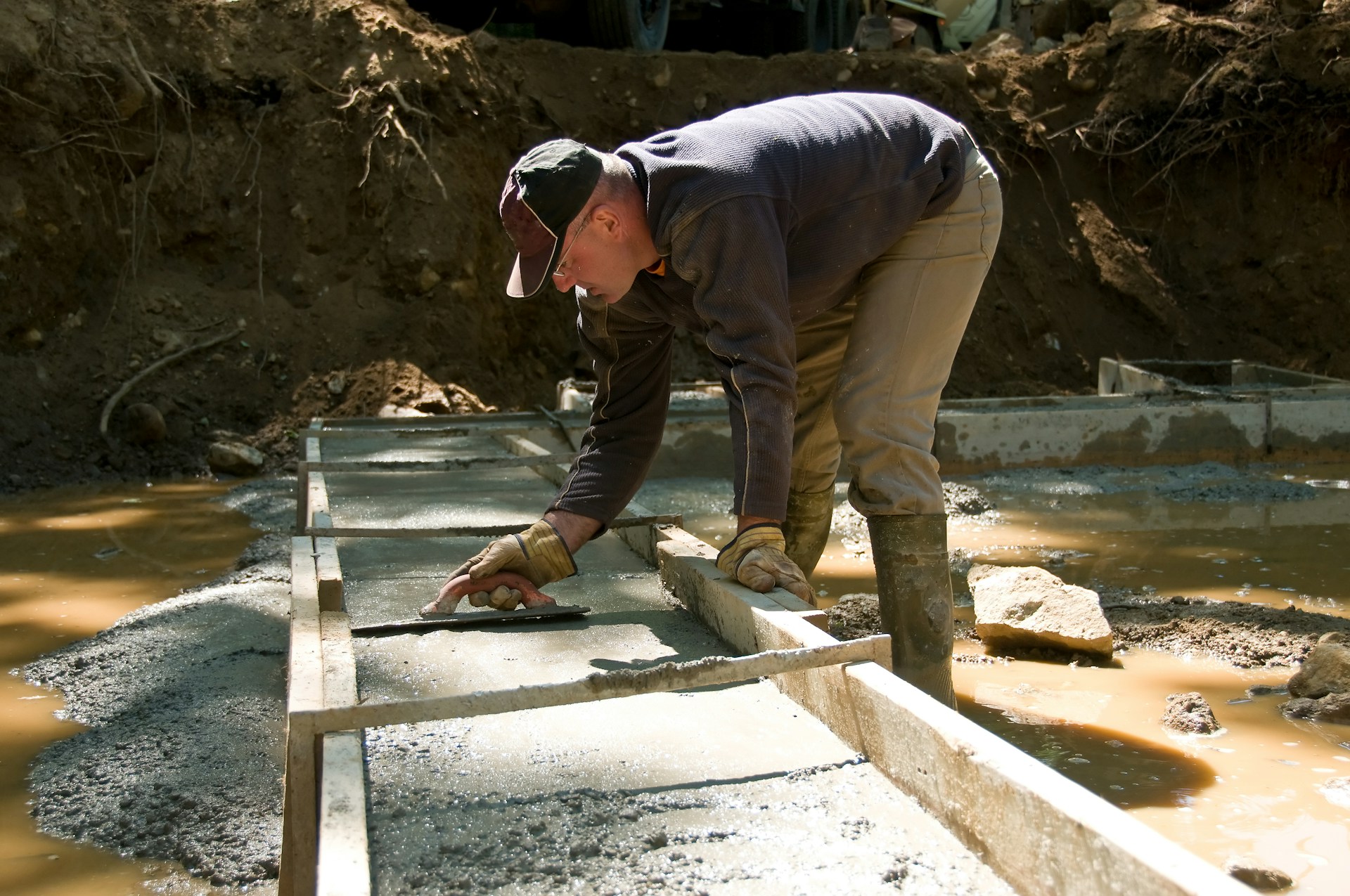Cracks along slabs, walls, or around windows can signal shifting soils and moisture. If you need foundation crack repair near Sarasota, acting early helps prevent water intrusion, uneven floors, and widening damage. Local conditions make timely, targeted repairs essential.
With Helicon, you get a licensed Florida team that understands coastal soils, high water tables, and storm seasons. We use proven methods—epoxy injections, polyurethane foam, and pier systems—to stabilize structures with minimal disruption. Clear assessments and right-sized solutions keep projects efficient.
In this guide, you’ll learn how to spot structural vs. cosmetic cracks, common causes in Sarasota, and repair options that actually last. By the end, you’ll know when to inspect, how to plan repairs, and how to protect your home.
Understanding Foundation Cracks
Foundation cracks come in different forms and can happen for several reasons, especially in places like Sarasota, where the soil and weather play a big role. Knowing how to spot and understand these cracks helps you decide when you need repairs to keep your home safe and stable.
Common Types of Foundation Cracks
Cracks in your foundation usually fall into a few types:
- Hairline: These are very thin and often caused by drying or settling. They usually aren’t serious but still need monitoring.
- Stair-Step: These zigzag through blocks or bricks and may point to uneven settling or soil movement.
- Vertical: These run straight up and down and can be caused by shrinkage or minor settlement.
- Horizontal: These are more serious and suggest pressure from outside soil pushing on your foundation wall.
Knowing the type helps you understand the potential risk and the necessary repair method.
Causes of Foundation Cracks in Sarasota
Sarasota’s sandy soil and coastal location create unique challenges. The loose, sandy soil often shifts, causing your foundation to settle unevenly.
Seasonal rain and humidity can make soil expand and contract, putting stress on foundations. Flooding or poor drainage lets water seep in, which can further weaken foundation walls.
Construction or heavy equipment nearby can also shake or move the ground beneath your home. Most of these will create cracks over time if left untreated.
How to Identify Structural vs. Non-Structural Cracks
Not every crack means your foundation is failing. Here’s how to tell the difference:
| Factor | Structural Crack | Non-Structural Crack |
| Size | Wider than 1/4 inch or growing over time | Thin hairline cracks, stable in size |
| Direction | Stair-step or horizontal patterns | Mostly vertical or random, less patterned |
| Location | Walls bearing heavy loads or basement walls | Surface-level or superficial wall cracks |
| Effect on Structure | Doors/windows may stick, or floors slope | No impact on doors, windows, or floor levels |
If cracks show signs of getting bigger or affect your home’s stability, it’s important to get a professional inspection quickly.
Foundation Crack Repair Methods
Fixing foundation cracks involves a few reliable techniques that focus on sealing the cracks and stopping further damage. These methods target the root cause and protect your home from water leaks and structural issues.
Understanding each option can help you decide what fits your foundation’s needs best.
Epoxy Injection Repairs
Epoxy injection is a strong and permanent way to repair cracks in concrete foundations. The process involves injecting a liquid epoxy into the crack, which hardens and bonds the cracked surfaces together.
This restores the foundation’s original strength and stops water from entering. Epoxy works well on dry cracks that are not actively leaking.
It fills even very narrow cracks tightly, preventing dirt and moisture from worsening the damage. Because epoxy bonds with the concrete, it effectively makes the crack part of the solid structure again.
This method is best for cracks caused by normal settling or minor shifts. Epoxy injection is quick, with little disruption to your home, and it creates a clean, long-lasting repair.
Polyurethane Foam Injection
Polyurethane foam injection is another popular approach that works on wet or leaking cracks. Instead of bonding, this foam expands after it’s injected, sealing gaps to stop water from flowing into your basement or crawl space.
Unlike epoxy, polyurethane remains flexible once cured, which helps it handle some movement in the foundation without breaking the seal. This flexibility makes it ideal for areas with ongoing moisture problems or slight shifts in the soil below.
This foam also blocks mold growth by keeping moisture out. The quick expansion and curing speed mean repairs can be done in one visit, minimizing your inconvenience.
It’s often paired with other repairs to ensure long-term protection.
Exterior Waterproofing Solutions
Sometimes cracks need more than just filling from the inside. Exterior waterproofing is a method that prevents water from reaching your foundation in the first place.
This involves excavating around the foundation to apply waterproof coatings and install drainage systems. A waterproof barrier, like a thick membrane or sealant, covers the outside of the walls.
Drainage systems, such as French drains or weeping tiles, redirect water away from your home’s base. This reduces moisture pressure on the foundation and prevents leaks through cracks.
Exterior waterproofing is especially useful in areas where heavy rainfall or poor soil drainage causes water problems. It protects your foundation over the long term by blocking water before it can cause damage.
Choosing the Right Sarasota Contractor
Picking the right contractor matters to get lasting foundation crack repairs. You want someone qualified with local experience and proper licensing.
These factors help ensure quality work and protect your home investment.
Qualifications to Look For
Check if the contractor has specific experience with foundation crack repair. Look for skills in slab lifting, crack sealing, and soil stabilization.
Certifications or training in foundation repair methods are a plus. Ask about warranties or guarantees on their work.
A trusted contractor should offer a clear warranty, showing confidence in their repairs. Reviews and references from past customers can reveal how well they deliver. Focus on contractors who solve problems efficiently and safely.
Local Experience and Knowledge
You want a Sarasota contractor familiar with local soil conditions and weather impacts. Florida soils vary, and coastal areas face unique challenges like erosion and high water tables.
Locally experienced contractors understand these factors and use the right methods, like polyurethane foam lifting or helical pier systems. They know how to handle sinkholes and concrete cracks common in the area.
Choosing a company rooted in Sarasota means they are more accessible for inspections, follow-ups, and emergency support.
Licensing and Insurance
Always confirm your contractor is licensed by the state of Florida for foundation repair work. A proper license shows they meet legal and safety standards.
Insurance is equally important. Your contractor should carry liability insurance and workers’ compensation.
This protects you if accidents happen on your property during repairs. Ask for paperwork upfront and verify it directly if needed. Avoid unlicensed or uninsured contractors to reduce risks.
| Key Checks | Why It Matters |
| State License | Ensures legal compliance and skills |
| Liability Insurance | Covers property damage during repairs |
| Workers’ Compensation | Protects you from liability if workers get hurt |
Cost Factors for Foundation Crack Repair Near Sarasota
When dealing with foundation cracks, the cost of repair depends on the type of damage and the size of your home. Several important factors influence how much you might spend, including the repair method needed and the soil conditions around your property.
Price Ranges for Common Repairs
Foundation crack repairs near Sarasota usually range between $300 and $1,000 for small cracks. These repairs often involve sealing or epoxy injections to stop water and further damage.
More extensive repairs, like fixing structural issues beneath the foundation, typically cost between $2,200 and $8,100. The average price is around $5,000, but large homes or severe damage can push costs higher.
If your foundation needs major work, like pier installation or full replacement, costs can go over $20,000. It’s best to schedule an inspection early to avoid larger expenses.
Factors That Influence Repair Costs
The size and location of cracks are key. Cracks larger than ⅛ inch usually need more advanced repair.
Also, the type of foundation you have—slab, crawl space, or basement—affects what methods and materials are needed. Soil conditions around your home play a big role.
Florida’s sandy or clay soils can shift, making repairs more complex. The age of your home and accessibility for repair equipment also impact labor costs.
If you have other issues like wall cracks or sloping floors, these can add to the total cost since they often require multiple repair approaches.
Preventing Future Foundation Cracks
Keeping your foundation strong means more than just fixing cracks as they appear. You need to control water flow around your home and keep a close eye on the foundation’s condition.
These habits help stop new cracks from forming and protect your property long-term.
Proper Drainage and Landscaping
Water pooling near your foundation can cause soil to expand and contract, which leads to cracks. You want your gutters and downspouts to direct water at least 5 to 10 feet away from the house.
Make sure your yard slopes away from the foundation, with at least a 6-inch drop over the first 10 feet. Avoid planting large trees or bushes too close, since roots can disrupt soil and create pressure on your foundation walls.
Using gravel or mulch near the foundation also helps keep moisture levels stable. Keeping drainage systems clear and landscaping designed to manage water protects your foundation from damage over time.
Routine Foundation Inspections
Regular foundation checks are crucial. You should schedule an inspection at least once a year or after heavy storms. Look for new cracks, uneven floors, sticking doors, or water seepage in basements or crawl spaces. Early detection lets you address small issues before they grow worse.
Professional inspections are important, too. Experts can find hidden problems, check for soil settling, and recommend timely repairs or maintenance. Staying proactive keeps your home stable and prevents costly fixes down the road.
Signs You Need Foundation Crack Repair
Foundation cracks often show up before bigger problems develop. Some signs are easy to spot inside your home, while others mean it’s time to get professional help.
Watching for these warning signs can save you from costly repairs later.
Visible Warning Signs in Your Home
Look for cracks in your walls, especially near doors, windows, or where walls meet. Cracks that are wider than 1/8 inch, stair-step cracks in brick or concrete, or cracks that keep growing are clear warning signs.
You may also notice doors and windows that stick or don’t open smoothly. Floors that feel uneven or sloped, or gaps forming around window frames and exterior doors, can mean the foundation is shifting.
Sometimes, cracks appear near the ceiling or floors, or you might see cracks inside the foundation itself. These signs show your home’s structure is under stress and needs attention.
When to Call a Professional
If you see any of these warning signs, especially cracking that worsens or affects doors and floors, it’s important to schedule a foundation inspection. A professional will evaluate the damage to decide the best repair solution.
Immediate help is needed if cracks are large, walls are bowing, or floors are sinking. Waiting too long can make repairs more complicated and costly.
A trained specialist will guide you through proven repair options tailored to your home’s condition. Early expert intervention protects your investment and keeps your home safe.
Timeline for Foundation Crack Repairs
When you notice cracks in your foundation near Sarasota, it’s important to act quickly but thoughtfully. The repair timeline depends on the size of the cracks and the extent of the damage.
First, scheduling an inspection usually takes about 2 weeks. The inspection itself is quick, often lasting just 1 to 2 hours.
This helps experts understand your foundation’s condition. After the inspection, you’ll receive a detailed proposal.
Sometimes this can be given the next day, but in some cases, it might take up to 6 months if engineering work or permits are involved. Repairs for small, interior cracks can be done within a few hours.
Larger, more complex cracks or foundation issues usually take about 2 to 3 weeks to fix. This includes preparing the site, performing repairs like concrete lifting or pier installation, and clean-up.
Here’s a simple breakdown:
| Step | Typical Timeframe |
| Schedule Inspection | About 2 weeks |
| Inspection | 1 to 2 hours |
| Proposal Delivery | 1 day to 6 months |
| Repair (minor cracks) | A few hours |
| Repair (major cracks) | 2 to 3 weeks |
You’ll always get guidance throughout the process. At Helicon, a dedicated consultant updates you regularly so you know what to expect.
How Sarasota’s Climate Affects Foundations
Sarasota’s climate can be tough on your home’s foundation. The region has a humid, subtropical climate, which means you get heavy rains, storms, and high humidity.
These conditions cause the soil beneath your home to change often. When the soil gets wet, it swells and pushes against your foundation.
When it dries, the soil shrinks, leaving gaps under your foundation. This constant movement can cause cracks, uneven floors, or sticking doors.
You also face risks from coastal factors like saltwater intrusion and erosion. Saltwater can weaken soil and concrete over time.
Coastal erosion can wash away soil, leading to gaps or settling issues. Here are key climate impacts on foundations in Sarasota:
- Heavy Rainfall: Causes soil to expand and can lead to water damage under slabs.
- Humidity: Increases moisture levels, which can weaken wood and concrete.
- Storms and hurricanes: Strong winds and flooding add stress to a foundation’s structure.
- Saltwater exposure: Can corrode metal supports and erode soil stability.
Post-Repair Maintenance and Monitoring
After your foundation cracks are repaired, it’s important to keep an eye on the area. Regular monitoring helps you catch any new issues early before they become serious.
Check for new or widening cracks around walls, floors, and ceilings. Watch for any signs of uneven floors or doors that start sticking.
These can be early signals your foundation needs attention. You should also control moisture near your home.
Keep gutters clean and direct water away from your foundation. Proper drainage helps prevent soil shifting, which can cause new cracks.
Here’s a simple maintenance checklist for you:
- Inspect repaired areas every 3-6 months
- Keep gutters and downspouts clear
- Maintain stable soil moisture around your foundation
- Report any new foundation changes to your repair company
Your Next Steps For A Stable Sarasota Home
Foundation crack repair near Sarasota protects value and safety. You’ve seen causes, signs, costs, and proven fixes. Act early to limit moisture, settlement, and recurring damage.
Helicon brings local expertise, clear assessments, and right-sized solutions. From crack injections to drainage upgrades, we match repairs to soil and climate. Transparent timelines keep projects on track.
Ready to move forward? Schedule an inspection or request a detailed quote today. Get a practical plan, fair pricing, and a stable foundation for the long term.
Frequently Asked Questions
How Do I Know If A Crack Is Structural Or Cosmetic?
Measure width and watch for change. Cracks over 1/4 inch or growing cracks need prompt evaluation. Horizontal or stair-step patterns suggest movement. Vertical hairline cracks are often non-structural but still need monitoring.
What Is The Best Method To Fix My Crack?
Dry, non-leaking cracks often suit epoxy injection. Leaking or active cracks respond well to polyurethane foam that expands to seal moisture. Your contractor may pair methods for durability.
How Much Does Foundation Crack Repair Near Sarasota Cost?
Small crack sealing can range $300–$1,000. Repairs tied to settlement or piers can run higher based on access and soil. An inspection refines scope and pricing.
How Fast Can Repairs Be Completed?
Many interior injections finish in a few hours. Larger stabilization, drainage, or pier work may take several days to a few weeks, depending on the scope and permitting.
Will Repairs Stop Water From Coming In?
Polyurethane injections are effective for active leaks. Exterior drainage, grading, and waterproof barriers help manage water at the source for long-term results.
Do I Need To Address Drainage Too?
Yes. Direct downspouts 5–10 feet away and keep gutters clear. Proper grading reduces hydrostatic pressure that can worsen cracks and settlement.
Can All Foundation Cracks Be Repaired?
Most can be addressed using sealing, stabilization, or both. Severe movement may require helical piers or soil improvement to restore support before sealing.
What Causes Cracks In Sarasota Homes?
Shifting sandy soils, seasonal rain, and high water tables are common drivers. Coastal conditions and nearby construction can add vibration and load changes.
How Often Should I Inspect After Repairs?
Check repaired areas every 3–6 months. Look for widening cracks, sticking doors, and floor changes. Early attention keeps small issues from growing.
When Should I Call For A Professional Inspection?
If a crack widens, leaks, or forms a stair-step or horizontal pattern, schedule an inspection.
Combine this with signs like sloping floors or sticking windows for faster action on foundation crack repair near Sarasota.





